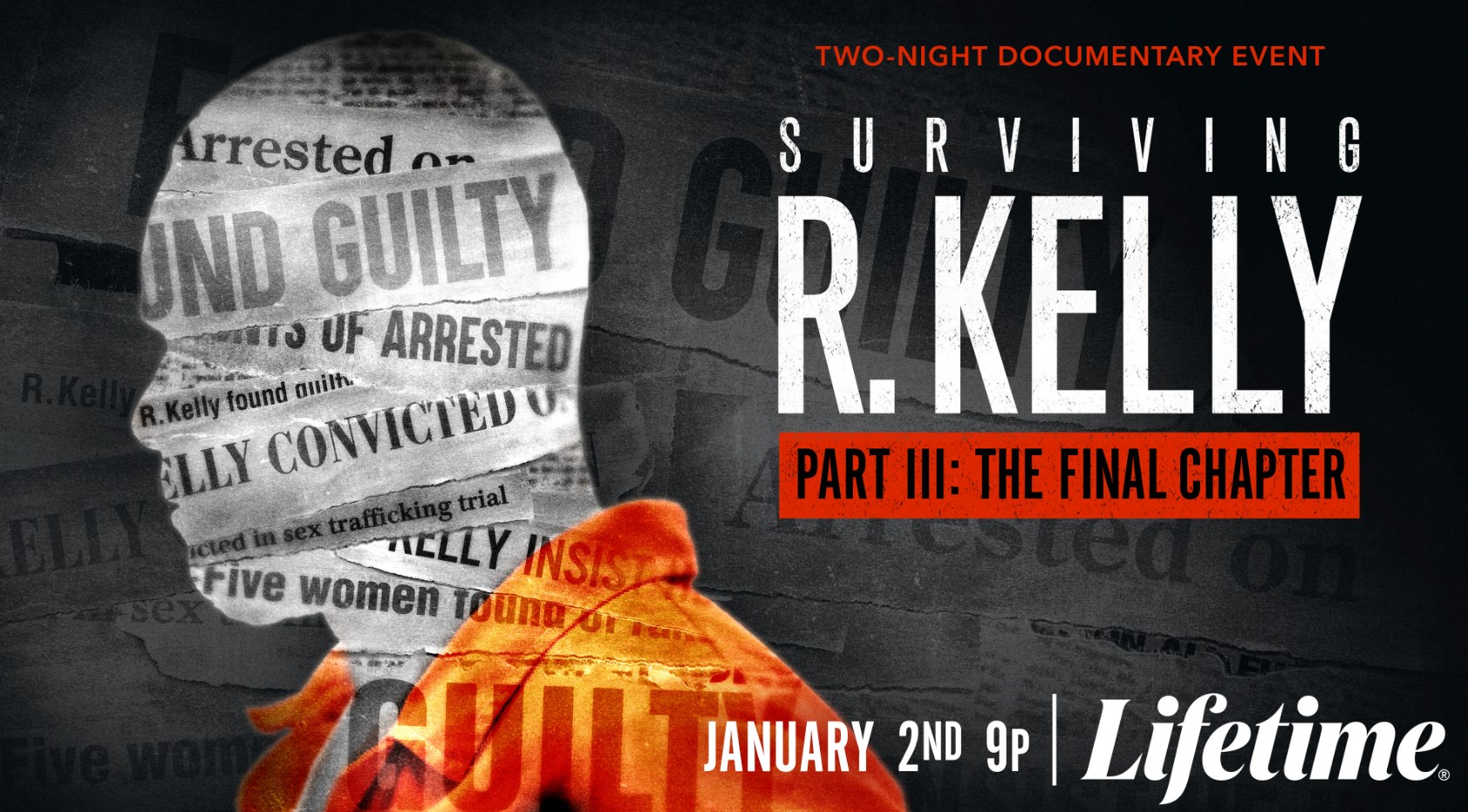The Impact of Surviving R. Kelly



(Please note – trigger warning for sexual assault.)
Last week, the final installment of Lifetime’s explosive Surviving R. Kelly docuseries aired – and it revealed new allegations from victims and disturbing details about his marriage to the late singer, Aaliyah.
Ebonie Doyle was one of the victims who hadn’t gone on record with her allegations prior to this installment of the series. She alleges that at 16, and just days after his marriage to Aaliyah, she was raped by R. Kelly. When her mother discovered her involvement with him, Ebonie says she was kicked out of her home, and with nowhere else to go, she moved in with him and was further subjected to his abuse and control. Ebonie revealed she found a sex tape of R. Kelly and Aaliyah and says when he discovered that she had seen it, he pushed her down a flight of stairs.
The docuseries revealed that R. Kelly married Aaliyah in 1994, she was just 15 at the time, despite the marriage certificate listing her as 18. Months later, the marriage was annulled by her parents who were pressured to sign a non-disclosure agreement by R. Kelly and his inner circle. According to Gem Pratt, R. Kelly’s former bodyguard, the NDA ensured charges would not be pressed over their daughter’s illegal marriage if the rights to his first three albums were sold to the family.
Given that Aaliyah was a minor at the time of their relationship and ultimately, their marriage, she was previously referred to as Jane Doe #1. However, during a 2022 federal trial, her name was mentioned 361 times – and R. Kelly was found guilty on three counts of child pornography and three counts of enticing a minor to engage in sexual activity.
There is much focus on R. Kelly’s inner circle, also referred to as his “handlers” and “enablers”. The series illuminates the fact that R. Kelly’s operation was truly a criminal enterprise with several key players who did everything from keeping a watchful eye on his victims, intimidating them and their families leading up to the several different federal and state trials, and even making attempts to disrupt the premiere of the docuseries. And that’s just how they supported him after he went to prison.
The series is a gut-wrenching watch, but according to prosecutors, it played a key role in helping them secure a guilty verdict, something that never happened when R. Kelly was acquitted back in 2008. A survivor named Lisa Van Allen, who testified at that trial, described her reluctance to testify again, saying:
“Back in 2008, I don’t feel like they looked out for me enough during the trial. They let the defence say pretty much anything they wanted to say about me. That bothered me a lot. The feds for this trial apologized for that, even though they weren’t there, and they said it would be nothing like the 2008 trial.”
Of course, so much has changed culturally since 2008. Culturally, the #MeToo movement created a shift, making it more difficult (not impossible but more difficult) for predators to maintain their systems of abuse. It’s why we’ve seen so many documentaries, similar to this one emerging.
Last year, Secrets of Playboy aired on A&E featuring Hugh Hefner’s Playboy bunnies, friends, business partners and staffers who detailed their time at the Playboy mansion and the abuse that took place there over the span of decades.
Since the #MeToo movement, there have also been several documentaries created about Harvey Weinstein. Some of them have been independently published to YouTube, some of them are larger productions that you can stream on platforms like Hulu. Some of them are actual movies, like Bombshell, based on the women at Fox News who set out to expose Roger Ailes. And on a smaller scale, there are podcasts like Something Was Wrong.
In previous seasons, guests have had one or two episodes to chronicle abuse, manipulation, or experiences they had with narcissistic romantic partners. However, in its most recent season, the podcast featured interviews with dozens of women who say they had been victims of a guy named Jake Gravbrot. The entire season chronicled his systematic abuse, which included recording women during sex, unbeknownst to them. It featured interviews with his ex-wife, women who had children for him and women he met and abused on dating apps. The podcast has inspired Reddit threads where listeners and victims have gone to discuss the revelations.
It’s hard to imagine predators being able to come back after being the subject of one of these documentaries or podcasts. But given the news that Bill Cosby is gearing up for a tour after years of being embroiled in sexual assault allegations, a comeback isn’t completely off the table, even for the worst of the worst.
W. Kamau Bell’s impeccably directed and produced miniseries on Bill Cosby was a fantastic watch. It gives an in-depth look at America’s obsession with him, starting with his early days as a comedian to him becoming a staple on TV to becoming “America’s dad”. But it paints a harrowing picture of what was happening behind the scenes – and in plain sight, really, since many of his stand-up routines clearly detailed his sinister sexual behaviour with women.
Despite how gripping and informative the series was, unlike Surviving R. Kelly, it didn’t do much to keep Bill Cosby in jail. After serving nearly three years and being released from prison in 2021, in December, a rep for the comedian announced his plans to start touring again this year following his sexual assault conviction being overturned (on a technicality) by the Pennsylvania Supreme Court in 2021.
Participating in a docuseries can bring victims a lot of visibility by allowing them to detail their experiences on a larger scale. But in the case of R. Kelly’s victims, who say they were already experiencing cyberbullying, harassment, stalking and living in fear, it shows there is great danger in speaking out.
The final installment of Surviving R. Kelly examines why people are so unrelenting in their loyalty to him – and why it’s indicative of a larger issue in Black culture. According to Dr. Treva Lindsey, author of America, Goddam, protecting men like Bill Cosby and R. Kelly is something people do to protect their memories and their enjoyment of someone perceived to be a predator, but also because we view Black men as victims and in need of protection:
“Even people who don’t know him personally have an affinity for him because his music has been the backdrop of some of these very significant moments for people. They’re protecting not only their memories and their association with the music, but also this idea of protecting this Black man who they feel is being targeted.”
The idea someone is being “targeted” is one of the most common narratives we’ve seen come up in discourses about male predators, particularly when they’re Black. Countless claims emerge that it’s a “witch hunt” and reinforces calls to “protect Black men”. But Surviving R. Kelly highlighted the difficulty of doing so when most of his victims were young Black girls.
Salamishah Tillet, a scholar and cofounder of A Long Walk Home, suggests this may be a cultural issue.
“We do a lot of work in our culture of not holding the person who’s committing these acts responsible. We are willing to blame everyone else around them. You have to do so much work to break the silence. The longer we continue to protect the assailants at the expense of victims, we’re just perpetuating the crisis,” she said in the second episode.
One of the questions posed in the Something Was Wrong Reddit thread asked whether it’s ethical to call someone out so publicly, despite allegations not being proven in court. It’s a question that came up over the weekend, when a TikTok star named Jovi Pena came forward to allege she had been raped at a New Year’s party hosted by Kai Cenat, widely considered to be one of the best Twitch streamers in the world.
Jovi posted about all the steps she took within 24 hours of allegedly being raped, which included going to the hospital, then the police. She also shared screenshots of her chat with Kai. While Jovi says she went public because she didn’t feel like things were moving fast enough, it appears that bringing it to social media may have helped move things along. Despite initially blaming Kai for endangering her the night of the party, she thanked him for taking her allegations seriously and for using his platform to encourage his fans to not harass her. He also cancelled a highly-anticipated meet and greet in London.
I spent my weekend going down the rabbit hole of these allegations. Prior to this, I hadn’t heard of Jovi or Kai, but I was intrigued to see the discourse surrounding her claims. While there were several naysayers and people quick to write her off and slut-shame her due to racy photos she had posted on her social media, for the most part, people were supportive of her and demanded that Kai turn his friend over to the police.
As I mentioned, it’s getting harder for predators to maintain their systems of abuse. And we see that in stories like Surviving R. Kelly. But we also see it in stories like Jovi’s. Despite Kai not being the person who was being accused of the actual sexual assault, it’s the pressure that was put on him to do the right thing. It’s getting more difficult for perpetrators, and it’s also getting more difficult for their networks to help them escape the consequences.
But we can’t turn a blind eye to the fact that as it’s becoming more difficult for some, we’re seeing men like Bill Cosby essentially pick himself up, dust himself off and gear up for a tour. So it’s great that we’re becoming less fearful of naming and shaming predators. But we have to ensure we have systems in place that make it safer for victims to come forward, tell their stories, and get some form of justice.
